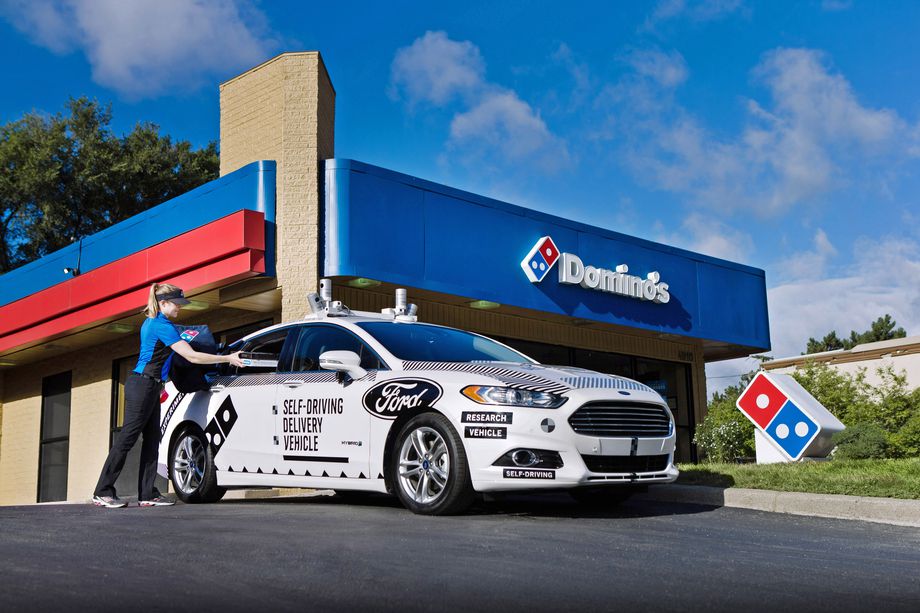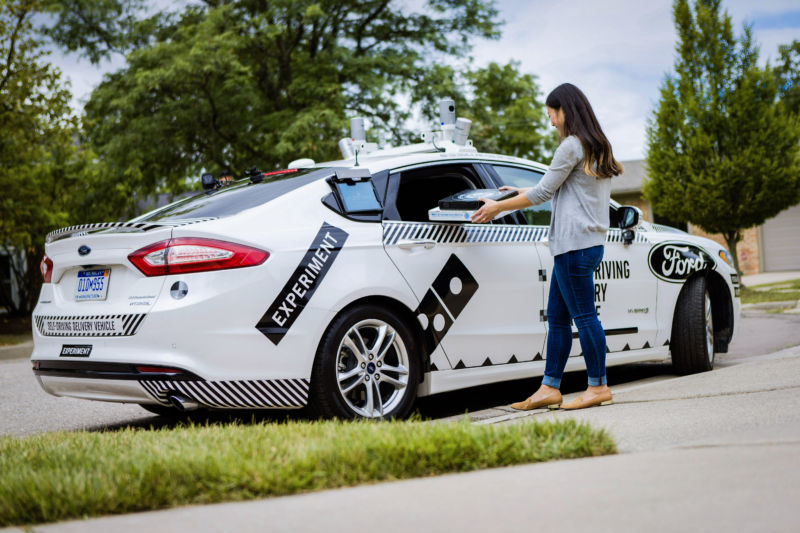Autonomous cars Ford will work as pizza delivery couriers

The other day it became known that Ford began testing its autonomous cars. At the same time, testing is carried out not somewhere in the landfill, but in the settlements. Cars perform a very specific task - deliver pizza from the company Domino Pizza. When ordering pizza, its customers receive a message from Domino with a code on their mobile phones.
After some time, a car pulls up to the client's house, and a touchscreen is mounted on the outside of the passenger window. A pizza customer needs to enter the received code using this touch screen. If the numbers match, the code is correct, the glass is lowered, and the customer gets the opportunity to pick up his order - a hot pizza only from the oven. It looks like a scene from some fantastic movie.
In the "courier" car from Ford there is a person, this is a professional driver who monitors the operation of all vehicle systems. If all is well, the person does not interfere. He is in the car then to take control if something suddenly goes wrong.
Ford analyzes the behavior of its cars on the roads, checks the operation of the systems, monitors problem situations so that the final version of the autopilot works like a clock. Ford’s partner, Domino Pizza, in turn, ensures that the pizza arrives on time. “Domino checks everything - from delivery time to the mood of the user who received the pizza, and also how easy it was for a person to get used to the pizza receiving system, how quickly the customer entered the code, whether the person could not keep the car’s rotating lidars from the roof, "- said the publication Detroit News.
In general, Ford cars in no way try to take away work from couriers and pizza delivery men. Actually, the performance of courier functions for cars with a computer control system, the cost of which can reach several hundred thousand US dollars, is not very relevant in terms of commercial gain. For companies like Domino Pizza, this is not very cost effective. On the other hand, if there are a couple of such “couriers” on the staff, this can attract attention both to the company and its products. And this is an opportunity to make a profit. Well, Ford neither advertising nor the opportunity to test its technology does not interfere.
Using a robotic car as a pizza delivery courier is a great way to test the capabilities of Ford technology. After all, pizza is ordered by everyone, and you have to go to the corners of the village where the tests are carried out to the most distant from the company's headquarters. Unexpected orders, rerouting, order cancellation - all this happens every day, and the vehicle has to respond to all this accordingly.

“We believe that autonomous technology can play a significant role in expanding the market for food delivery,” said Sheriff Marakbi, a Ford spokesman who heads the development of autonomous systems for passenger cars. He argues that the company plans to expand the range of use of its ro-mobiles in the future, although we can already say that such vehicles will not be engaged in solving some exotic problems.
These cars will be put on the service of commercial organizations that sell any goods or provide taxi services. Also, cars with full autopilot should be appreciated by ordinary car enthusiasts - after all, for example, Tesla cars are not least popular due to the Autopilot system. Actually, this is logical, since Ford itself is a commercial company, its main task is to make a profit, and research in the field of autonomous machines is at the service of the main goal.
Of course, not only cars can deliver pizza. Drones, relatively small ground robots - all of these systems can work as couriers. But, since Ford is a car developer, the company plans to develop, first of all, its automobile business, and only then seek to fulfill any side goals. Ford is currently conducting only preliminary testing of its technology, so do not expect too much from it. Before the advent of truly autonomous cars that are able to move without problems and worries on public roads for several years.
The company hopes to release its own robomobils (already commercial version), which can do without human help, by 2021. True, company representatives once said that the waiting period for such cars could be longer.
All Articles